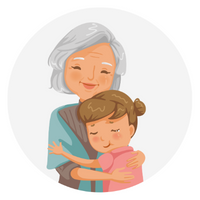Disclaimer: Devoted Grandma is reader-supported. If you purchase anything through my site, I may receive a small commission (at no cost to you). Thank you.

As grandmothers, we cherish the bond we have with our grandchildren. There’s nothing quite like the warmth of their hugs, the twinkle in their eyes when they see us, or the joy of passing down stories and traditions. But sometimes, we find ourselves on the outside looking in—kept at arm’s length by our own children when it comes to their little ones.
It’s painful. It can feel unfair, confusing, and heartbreaking. We may wonder, What did I do wrong? Why am I being shut out?
The truth is, parents don’t take the decision to limit contact lightly. They usually have reasons, whether we agree with them or not. The best thing we can do is try to understand their concerns and, if necessary, make changes to rebuild trust.
Let’s take a look at 14 reasons why parents might feel the need to shield their children from their grandparents—and what we can do to bridge the gap.
1. Toxic or Hurtful Behavior
Some grandparents engage in toxic behavior without realizing it. Constant criticism, passive-aggressive comments, favoritism, or even emotional manipulation can make parents feel like their children are better off with limited exposure.
✅ What We Can Do: Take an honest look at how we interact with our grandchildren and their parents. Are we encouraging and uplifting, or are we unknowingly tearing them down?
2. Disrespecting Parenting Choices
Parenting styles change with each generation, and sometimes, we struggle to understand (or accept) these modern methods. Whether it’s about discipline, diet, screen time, or sleep routines, parents may feel frustrated if their rules are ignored or belittled.
✅ What We Can Do: Even if we disagree, we must respect their choices. If they ask us not to give sugary snacks, let’s not sneak them a cookie “just this once.” It’s about showing we respect their authority.
3. Unsafe Environments
A grandparent’s home may not always be child-friendly. From a cluttered house with tripping hazards to a swimming pool without a fence, parents might worry about safety risks. Even things like an aggressive pet or unlocked cabinets full of medication can make parents uneasy.
✅ What We Can Do: Take a walk around our home with fresh eyes. Would a toddler be safe here? If not, a few small adjustments—like baby gates or securing hazardous items—can go a long way.
4. Substance Abuse Issues
If a grandparent struggles with alcohol, drugs, or prescription medication misuse, parents may feel it’s unsafe for their children to be around them unsupervised.
✅ What We Can Do: If this applies to us or our spouse, seeking help can not only improve our relationship with our grandchildren but also give us a healthier, happier life.
5. Verbal or Emotional Abuse
Words can cut deeper than we realize. If a grandparent often insults, belittles, or uses guilt to manipulate family members, parents may limit interactions to protect their child’s emotional well-being.
✅ What We Can Do: Watch our words carefully. A single harsh comment can stay with a child for years. Let’s build them up, not tear them down.
6. Racism, Sexism, or Prejudice
Today’s parents are raising children to be more accepting and inclusive. If a grandparent openly expresses racist, sexist, homophobic, or otherwise prejudiced views, parents may want to shield their children from that mindset.
✅ What We Can Do: Even if we were raised differently, we can always grow. If a parent says something we said is offensive, instead of being defensive, we can ask, How can I be more mindful?
7. Playing Favorites
Favoritism among grandchildren is a surefire way to create division within a family. If one child always gets the best gifts, the most attention, or special treatment, parents will notice—and they won’t like it.
✅ What We Can Do: Love all our grandchildren equally. Each child is special in their own way, and they all deserve to feel valued.
8. Inappropriate Conversations
Little ones don’t need to hear about family drama, financial problems, or adult conflicts. If we overshare, parents may feel the need to step in.
✅ What We Can Do: Keep our conversations with grandchildren light and joyful. If we need to vent, we should call a friend, not burden our grandkids.
9. Forcing Physical Affection
In past generations, kids were often told to hug and kiss relatives whether they wanted to or not. But today’s parents want their children to understand consent and body autonomy.
✅ What We Can Do: Let children decide when and how they show affection. A simple, “Would you like a hug?” gives them control.
10. Unreliable or Inconsistent Presence
If we make promises we don’t keep, frequently cancel plans, or disappear for long stretches, parents may decide that it’s best not to let their child get too attached.
✅ What We Can Do: Be a steady presence, even in small ways. A weekly phone call or a surprise letter in the mail can mean everything.
11. Conflicts with the Parents
Sometimes, parents shield their children not because of direct issues with the grandchild, but because of unresolved conflicts between us and them.
✅ What We Can Do: Work on healing our relationship with our adult children. A sincere apology can open doors we thought were closed forever.
12. Religious or Cultural Clashes
If we push our religious beliefs or cultural values onto our grandchildren against their parents’ wishes, it can cause friction.
✅ What We Can Do: Share our traditions without forcing them. Let our grandchildren explore and make their own choices.
13. Parental Alienation
No parent wants to feel like they’re being turned into the “bad guy.” If a grandparent badmouths a parent or encourages rebellion, it can lead to separation.
✅ What We Can Do: Support the parents, even when we don’t agree with them. Our role is to bring the family together, not drive it apart.
14. Emotional or Physical Neglect in the Past
If a parent had a difficult or painful upbringing, they may be hesitant to allow their own children to have a relationship with the same people who hurt them.
✅ What We Can Do: If we made mistakes in the past, acknowledging them is the first step to healing. A heartfelt, “I am sorry, and I want to do better,” can make a difference.
Final Thoughts: Healing the Divide
Being kept at a distance from our grandchildren is painful, but it doesn’t have to be permanent. We can rebuild trust by listening, respecting boundaries, and showing that our love is unconditional.
The good news? It’s never too late to grow, to heal, and to create a warm, loving family bond that lasts for generations. 💖

